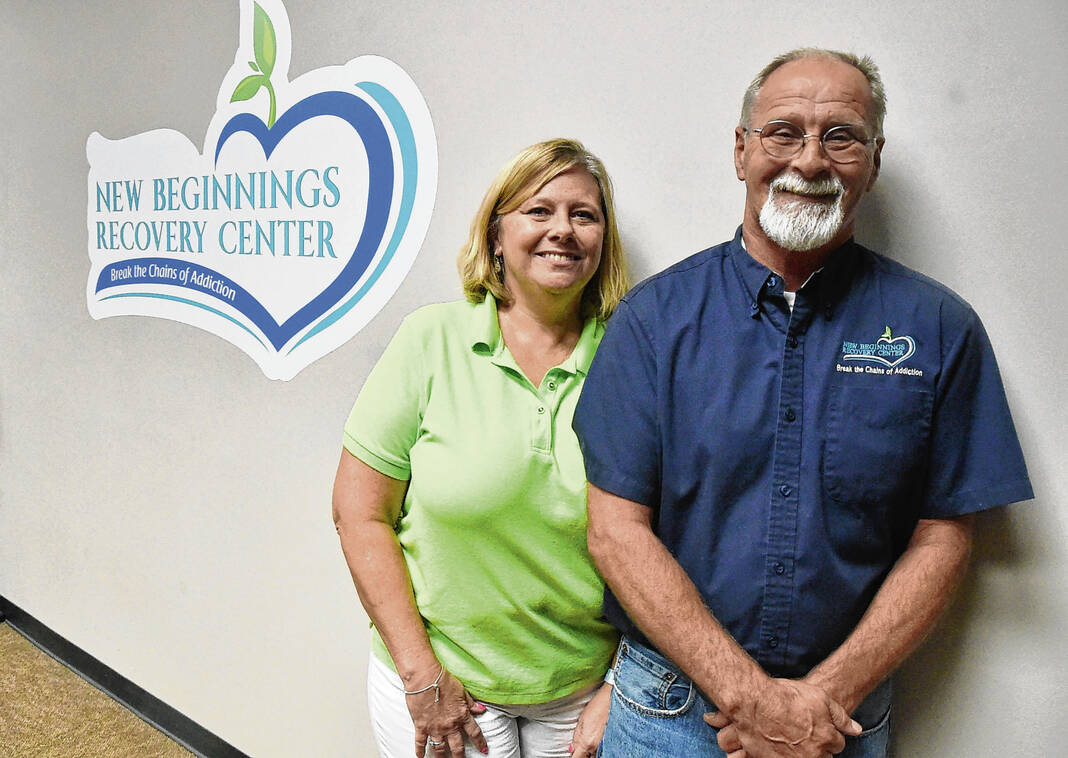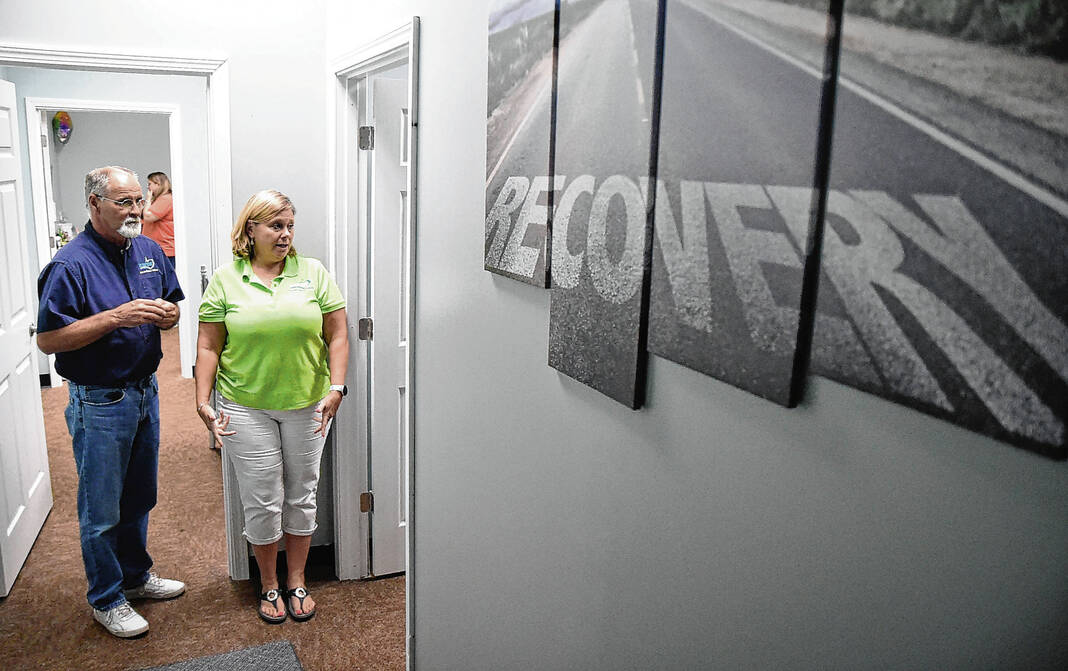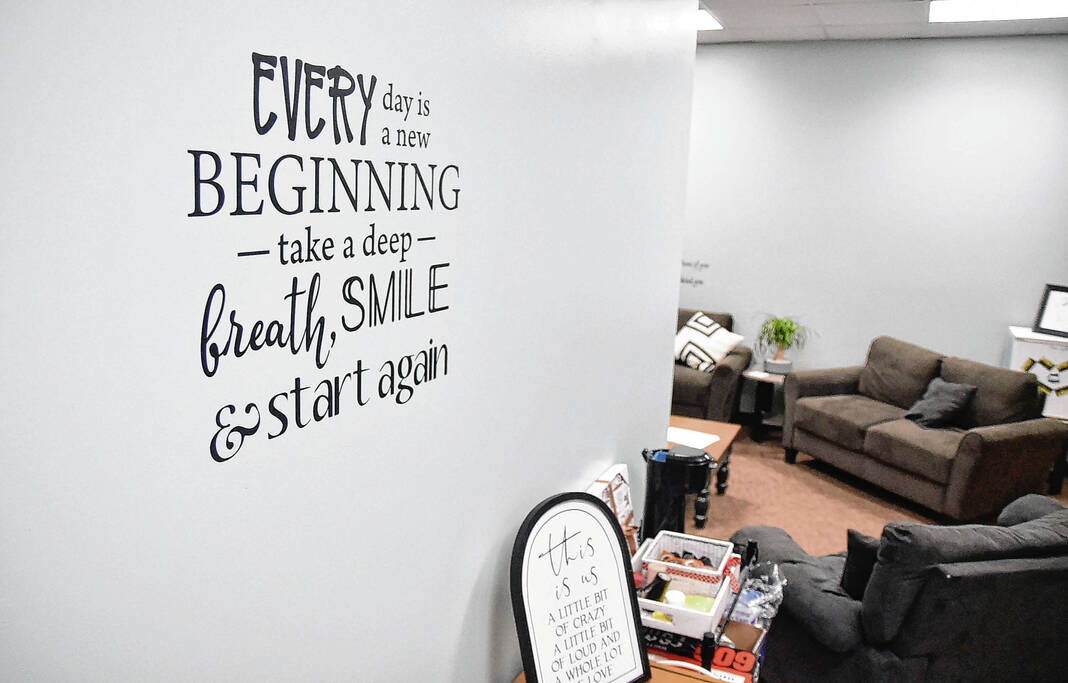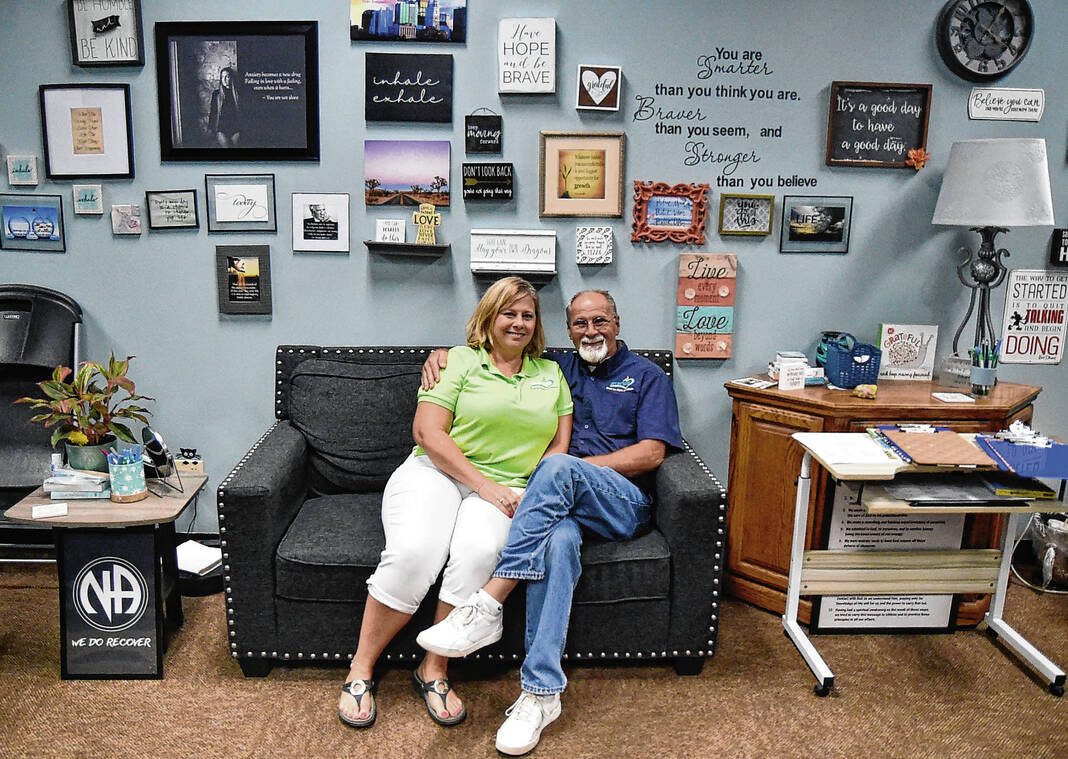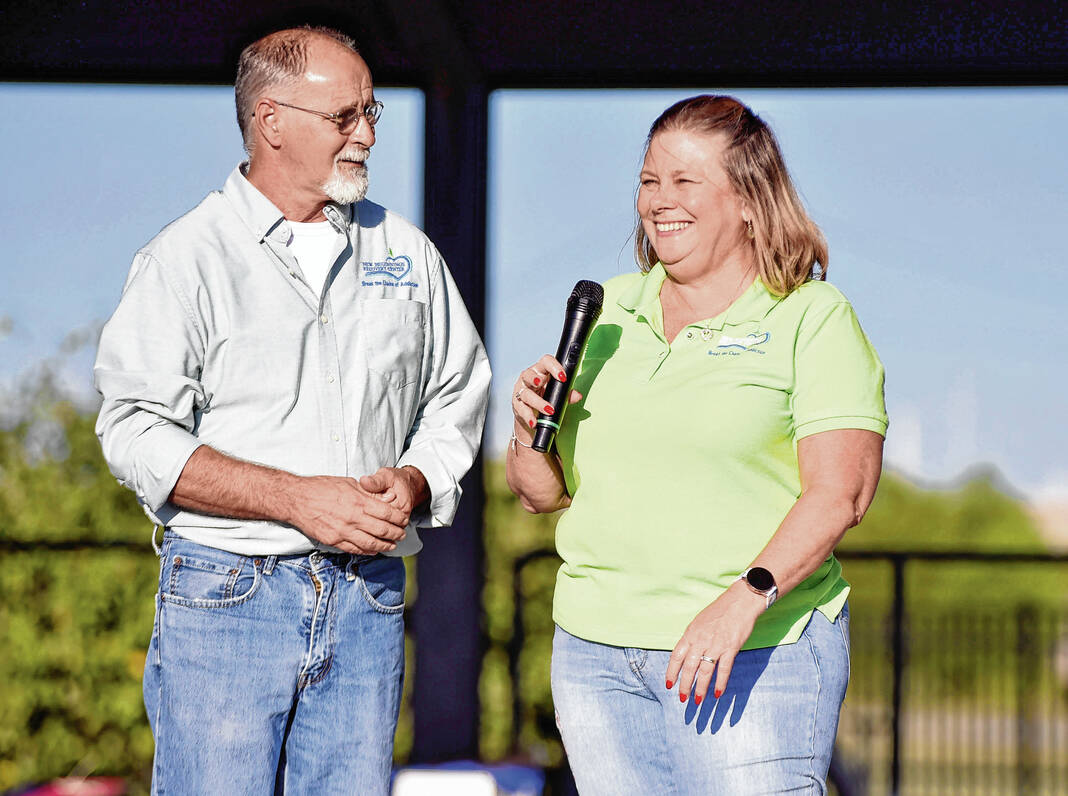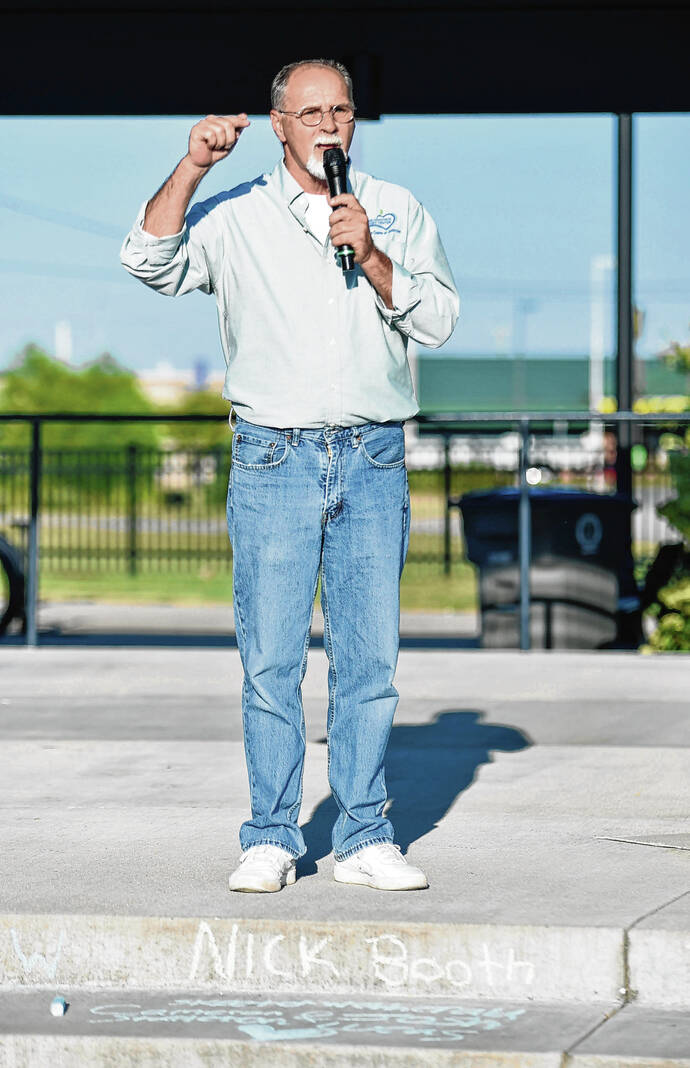On Nov. 11, 2018, Teresea Higham opened New Beginnings Recovery Center in a 630-square-foot suite in a downtown Seymour building.
The business plan for the therapy private practice was based on 15 full-time patients. She primarily worked with people with addictions and developed a mental health treatment plan for them.
Within two months, she had 15 patients. Eight months in, she was putting in a lot of work at the center and at home and realized she couldn’t continue to do it by herself.
In February 2020, she hired her first employee. Later, her husband, Michael Higham, wound up leaving his job and joining the practice.
Now, nearly four years later, New Beginnings occupies 3,500 square feet, has 15 employees in-house and serves 500 active patients through 30 intensive outpatient programs. The staff now includes a psychiatric nurse practitioner, therapists and counselors.
“The need is so unbelievable. It’s crazy,” Michael said. “The cool thing that we have is that a lot of our people who work on the addiction side, all of us are recovering addicts. It knocks down the wall (for patients) because now, I’m not just a counselor.”
Most of their patients live in six area counties. One, though, is coming all the way from Lexington, Kentucky, and another one comes from Evansville.
“We only advertise through Facebook,” Michael said. “Most of it is word of mouth.”
From the beginning, the Highams have agreed if someone comes through the door and asks for help, they are going to get it.
“I don’t care if they can pay for it or not. We’ll figure it out. You’re not going to get turned away. As long as you’re struggling, I’m in, I’m with you,” Michael said, noting he understands there are so many obstacles or barriers to treatment because he experienced those himself.
They started a nonprofit organization, Recovery First Corp., to help patients overcome those obstacles.
“Resources around were changing, and obstacles are always changing,” Michael said. “Now, we’ve got a binder of solutions for you. If you have a problem or a barrier to treatment, we have a solution for that.”
Teresea is originally from Aurora, while Michael is from Columbus. They have been married for 15 years and live in Columbus.
Teresea worked in retail management before meeting Michael and learning he was a recovering addict. That inspired her to pursue education in addiction counseling and mental health counseling and ultimately start New Beginnings.
Michael is a U.S. Air Force veteran and has held various jobs, including military police, emergency medical technician, communications and forestry.
In his younger years, though, he said he always struggled with some sort of reckless behavior and was always in trouble.
At age 10, he started smoking weed.
“I was the guy that could recreationally use and still function as best I could,” he said. “I found myself substance-dependent, so I struggled with that for several, several years. I didn’t realize that my behavior had caused all of these problems my whole life. I was a gymnast. Still, nobody knew. I had this secret my whole life.”
As he got older, Michael said the stresses of life became larger and his disease progressed until one day, he was completely dependent.
“It was daily use,” he said. “You see the pictures of the addicts, that was me. It was really bad. I had used about everything over a period of time. At the end, it was methamphetamine. Cocaine before that.”
He managed to stop for a while and tried to make a change when he met Teresea, who initially had no idea what was going on with him.
“It didn’t take long without any kind of a recovery program for me to relapse, and there she was in the middle of it,” Michael said.
“I had never been around it,” Teresea said. “I didn’t know what addiction was. I wasn’t around it. The circle that I traveled was not like that, so it was a big learning curve for us.”
In 2008, Michael went to an inpatient rehabilitation facility in Kentucky. After that, he still struggled a little bit, but then he became involved in Narcotics Anonymous.
“I started doing service work, and I became area chairperson for NA for south central Indiana, really got into recovery,” he said.
On Aug. 2, 2009, Michael became clean.
“At the time, I was 45 years old, I had a brand-new baby and brand-new wife that wasn’t going to give up on me,” he said. “Fortunately, we had enough resources for me to seek help. I was very lucky that I had enough people that were willing to give to me and were very patient with me. That whole process began for me through a very healthy support group. Then also, treatment.”
At nearly two years clean, Michael began his own education with addiction counseling.
“I went back to school for me to figure out what was going on with me because I just wasn’t picturing myself being like I was, and I couldn’t figure out how this had happened because I always felt like I was successful, but it turns out I was always limiting myself,” he said. “I was a lot smarter, I thought, than what was going on with me.”
The Highams learned addicts come from all backgrounds and professions.
“We both wanted to learn more about this crazy thing that had torn our family into shreds,” Teresea said.
“In the beginning, it was a challenge, but it was what I needed,” Michael said. “I had to get educated on the disease of addiction, figure out ‘How do we prevent this?’”
While doing internships at different professional facilities, Michael said he saw how they worked and how the disease was being treated.
“I just shook my head and I thought, ‘Oh my gosh! There’s no wonder that people aren’t better’ because I just didn’t see what they were doing working for me, and I thought, ‘There’s got to be a better way,’” he said, noting Teresea experienced the same thing.
That led to Teresea starting her own treatment center and Michael later joining.
Half of New Beginnings focuses on mental health, and the other half is all about substance abuse treatment.
“It’s unique to every individual’s needs,” Teresea said. “We have individual therapy, couple or family therapy, group therapy, a life skills group we’re working on.”
Michael said they are very patient-focused.
“So it’s not a cookie-cutter approach,” he said. “We meet with you, we do an intake, we do an evaluation, we find out what your needs are and we help you find out what your needs are and then we come up with a treatment plan based on what works best for you.”
Of the patients they see, 60% are related to alcohol abuse, Michael said.
While he acknowledges the use and treats the use, he said there’s only one common denominator.
“Every one of us always felt like we didn’t fit in, always felt like we were less than, always felt like good things couldn’t happen to us, that if people really knew who we were, they wouldn’t like us,” he said. “We keep that secret our entire life that starts long before we ever use a substance. For some of us, we grab ahold of that and we do whatever we can to get away from that, and it starts very young.”
The misnomer behind addiction is people want to believe someone is an addict because they use a substance, he said.
“That’s not true,” Michael said. “You use a substance because you’re an addict, so it’s just self-medicating, it’s just an escape. The only escape, the only reason we use anything is to change the way we feel, which suggests that we’re not comfortable with the way we feel or you just lack it.”
That’s what the Highams and their staff address, and that’s what makes New Beginnings different than other recovery centers, Michael said.
The average length of time in one of their substance use treatment programs is seven months, but that varies on the person.
Usually, trauma started at an early age, that led to substance use and that’s what needs to be addressed, Michael said.
“Later on, you start seeing patterns of addictive behavior, obsessive-compulsive disorder, and it’s compounded by low self-esteem. That’s what we have to work on,” he said.
“If I make you understand why you think the way you think, why you feel the way you feel and then I help you understand how your brain works, then we’re way ahead of the game,” he said. “If I can get you to where you feel good about yourself and you’re comfortable, the need to use goes away on its own. If I just concentrate on getting you not to use, you’ll always need to use.”
Teresea said it’s important to educate their patients and let them know their addiction doesn’t define them.
“So many people just give them this diagnosis and they don’t know what it means. They don’t understand all of the things, just know they have this need,” she said. “Here, they are people, and that is really huge for us.”
Seeing people break the chains of addiction is so exciting, Michael said.
“You haven’t experienced anything until you’ve watched someone come alive,” he said. “When they get to come alive again, that is the payday. It’s great. It has made me a big crybaby. You can’t help but be emotional when you see it.”
They get a good job with benefits, buy a car, buy a house, get married, start a family, get their kids back or get their self-respect back. That’s what it’s all about for the Highams.
Michael got a new beginning, and he wants to do that for others through New Beginnings.
“I had to give what I went through a purpose,” he said. “I truly believe that everything I went through, there was a reason I did, a reason that has now got purpose. It wasn’t just a horrible time in my life. It has purpose.”

